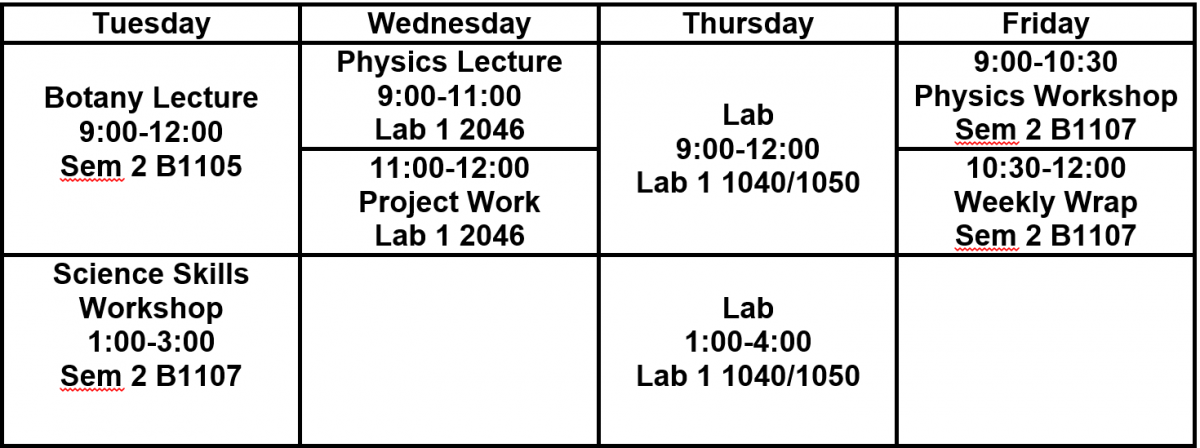Dear Plants in Motion students
Welcome to Plants in Motion, an introduction to the interesting intersection of botany and physics! For those of you new to the college, welcome to Evergreen! We hope you are having a good break and are looking forward to our upcoming work this spring.
We are writing with some information about the program to give you a better sense of what to expect. We have been hard at work planning aspects of this program, and are excited about beginning our work together as a class. Our academic backgrounds reflect the disciplines we will study in the program: Lalita is a plant biologist and Krishna is a physicist who also teaches math. We each have several years of experience teaching and learning at Evergreen and elsewhere. In PiM, we are particularly interested in ways in which the fields of botany and physics support, reinforce, and provide new perspectives on one another and in particular on the fascinating physical world of plants.
You should review the catalog description for our program http://evergreen.edu/catalog/2015-16/programs/plantsinmotion-14158. Our main areas will include introductory botany with lab (6 credits anticipated), topics in algebra-based physics with lab (6 credits anticipated), and an interdisciplinary research project (4 credits anticipated). What we are most excited about in the program, however, are the synergistic ways in which our principal subject areas will interact with one another and the collaborative learning community we will build through supporting each other with this challenging material.
Our program website is sites.evergreen.edu/plantsinmotion. The website will contain scheduling information, announcements, homework problem sets, etc., and will serve as a central clearinghouse of information for our program. Please get in the habit of checking the website frequently.
We know that many students have questions about their preparation when entering a program like PiM with significant science and math content. This is particularly true since many of you are new to Evergreen (again, welcome!) and others of you may well have been away from mathematics for some time. We are glad this program is of interest to students with diverse backgrounds, and we don’t expect any particular preparation in botany or physics, though of course previous study of any science is a plus.
However, as noted in the catalog description, “Proficiency in algebra is required”. Some background in general biology recommended, but not required.
- If your algebra is rusty or if you were weak in algebra during your previous classes, and you have the time and capability to take advantage of resources like the Quantitative and Symbolic Reasoning (QuaSR) Center, then you will probably be able to keep up with the math requirements. If you are not able to devote time to developing basic algebra skills, then you should take a basic pre-college algebra course elsewhere to prepare for college-level science work in the future.
- A recent general biology course that covered cell biology, diversity of life, mitosis, meiosis, and evolution is recommended. If you have not had a recent general biology course, we recommend reviewing chapters 2, 3, 11, and 12 of Raven Biology of Plants (or the equivalent material in any general biology reference) prior to the start of the program.
We ask you to do the following as soon as you can:
- Complete the on-line Student Survey available through our program website as soon as possible and no later than the first day of class. You can find the Student Survey by using the navigation bar above or by clicking here.
- Obtain our program textbooks, making sure that you have them and access to the associated on-line components by the first day of class. You can find details about Texts & Materials by using the navigation bar above or by clicking here.
Our class schedule is as follows  You will see from the above schedule that our principal activities include lectures, labs, and workshops. We will have quizzes each week in botany and physics, and final exams in those subjects as well. Your time spent outside of class (including: carefully reading our program texts; working on homework sets, labs, and other assignments; preparing for labs, workshops, quizzes, and exams; and working on the research project) will be significant; you should expect the total time to be at least 40-50 hours/week (including class time). We encourage you to think concretely now about how this time will dovetail with your other obligations such as work and personal commitments. Please feel free to contact us with questions you might have. We look forward to meeting and working with you this spring.
You will see from the above schedule that our principal activities include lectures, labs, and workshops. We will have quizzes each week in botany and physics, and final exams in those subjects as well. Your time spent outside of class (including: carefully reading our program texts; working on homework sets, labs, and other assignments; preparing for labs, workshops, quizzes, and exams; and working on the research project) will be significant; you should expect the total time to be at least 40-50 hours/week (including class time). We encourage you to think concretely now about how this time will dovetail with your other obligations such as work and personal commitments. Please feel free to contact us with questions you might have. We look forward to meeting and working with you this spring.
Sincerely,
Lalita Calabria (calabrial@evergreen.edu)
Krishna Chowdary (chowdark@evergreen.edu)

